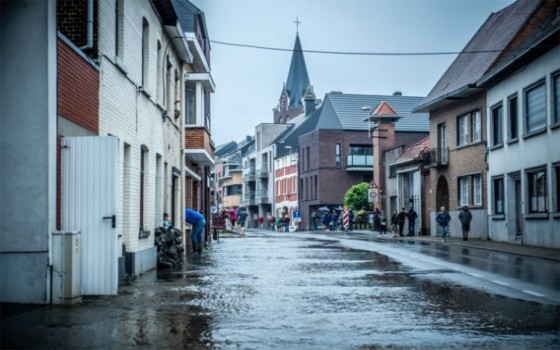
Europe faces climate threats that require resilient infrastructure and early warning systems. Last year saw record-breaking temperatures, storms, and floods.

- Europe and Arabs
- Saturday , 19 April 2025 7:53 AM GMT
Brussels - New York: Europe and the Arabs
With global temperatures rising and Europe facing increasing climate threats, an international report has emphasized the urgent need for resilient infrastructure, early warning systems, and informed decision-making at all levels of society. This comes after Europe experienced its warmest year on record last year, accompanied by severe consequences resulting from extreme weather events, according to the State of the European Climate 2024 report issued by the Copernicus Climate Change Service and the World Meteorological Organization. According to the UN daily news bulletin, a copy of which we received, the annual report, which is based on contributions from nearly 100 scientists, highlighted widespread climate impacts across the continent, including unprecedented heat waves, severe flooding, melting glaciers, and increased human exposure to heat stress. Storms and floods claimed at least 335 lives in Europe and affected nearly 413,000 people in 2024. A third of Europe's river network exceeded the "high" flood threshold, marking the largest flooding since 2013.
The report documents a stark climate divide, with Eastern Europe experiencing record-breaking drought and heat, while Western Europe experienced one of its ten wettest years since 1950.
Southeastern Europe experienced the longest heatwave on record in July, lasting 13 days and affecting 55% of the region. Heat stress also persisted, with 2024 recording the second-highest number of "strong," "very strong," and "extreme" heat stress days on record.
The Mediterranean sea surface temperature reached 1.2°C above average, the highest temperature ever recorded.
According to the report, glaciers in Europe have seen significant decline. Glaciers in Scandinavia and Svalbard have recorded their highest losses on record, with glaciers in Svalbard losing an average of 2.7 meters.
Celeste Saulo, Secretary-General of the World Meteorological Organization, said: "Every additional fraction of a degree of temperature rise counts because it increases the risks to our lives, our economies, and our planet. Adaptation is essential. That's why the World Meteorological Organization and its partners are intensifying efforts to strengthen early warning systems and climate services to help decision-makers and society as a whole become more resilient. We are making progress, but we need to go further and faster, and we must go together."
Despite the challenges, the report notes positive steps in renewable energy and climate adaptation. Renewable energy accounted for 45% of Europe's electricity generation in 2024, a new record. In addition, 51% of European cities now have dedicated climate change adaptation plans, a significant increase from 26% in 2018.
The report includes a comprehensive, data-driven overview of this year's climate conditions, featuring more than 130 visual resources, and highlights events such as Storm Boris, which caused deadly flooding in Central and Eastern Europe, and torrential rains in the Spanish region of Valencia.












No Comments Found